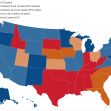On January 28th, 2021, President Biden honored another of his campaign promises when he issued a presidential memorandum that rescinds his predecessor’s elimination of federal aid for any foreign health provider that performs or actively promotes abortion as a method of family planning.
During the signing ceremony in the Oval Office, Biden told reporters, “The memorandum will "reverse my predecessor's attack on women's health access.” He continued, “The measure relates to protecting women's health at home and abroad, and it reinstates the changes that were made to Title X and other things making it harder for women to have access to affordable health care as it relates to their reproductive rights."
Biden’s remarks are directed at the “global gag rule” or the Mexico City Policy, an attempt to erode women’s right to choose, which created a regulation roller coaster since President Reagan first eliminated U.S. global family-planning assistance in 1984. Both presidents Clinton and Obama reinstated it, but following party lines, President Trump again revoked it in 2017 through what he called the “Protecting Life in Global Health Assistance Act.”
In addition to restricting funds for family planning by making all aid recipients certify they would not perform abortions, Trump’s actions effectively removed approximately $9.5 billion in aid for necessities such as HIV treatment, clean water projects, tuberculosis, nutrition programs and child immunizations. In addition, any foreign aid recipients had to pledge they would not provide financial support to any other organizations that perform or actively promote abortion as a method of family planning.
On January 28, a week after the 48th anniversary of Roe v. Wade, President Biden changed all that. The U.S. will now allow foreign non-governmental organizations (NGOs) to receive federal funds if they provide abortion counseling or referrals. A White House fact sheet states, “Across the country and around the world, people — particularly women, Black, Indigenous and other people of color, LGBTQ+ people, and those with low incomes — have been denied access to reproductive health care.”
The executive director of Hope for Kenya Slum Adolescents Initiative attested to the truth of this statement. Melvine Ouvo told POLITICO and CNN that “some clinics in hard-to-reach areas closed” as a result of the Trump rule that left many teenagers without any health care. Others say that women often lose their lives by resorting to illegal abortions after clinics have closed.
In addition to addressing global concerns, the President today also directed the Department of Health and Human Services to “take immediate action to consider whether to rescind regulations under its Title X family planning program.” His Oval Office statement said, “The measure reinstates the changes that were made to Title X and other things making it harder for women to have access to affordable health care as it relates to their reproductive rights."
Title X had removed tens of millions of dollars in grant funds from Planned Parenthood and other organizations that perform abortions. As a result, hundreds of clinics and organizations were removed from Title X, and women throughout the country were left without needed health care.
These policy changes will likely take months to go into effect because of the need for reapplication and approval.
When Trump issued the Title X rule changes in 2019, his action sparked several challenges in federal court. A federal judge in Oregon first blocked the rule that arose from a case filed by 20 states, Planned Parenthood and the American Medical Association. But the 9th Circuit overruled the Oregon opinion. As a result, Planned Parenthood, which had covered over 40% of Title X patients had to withdraw from the program. Six states were left entirely without Title X providers.
These actions are the first steps in the new administration’s reproductive rights agenda, but not the last. The Biden Administration also wants to codify Roe v. Wade, the decision that protects a pregnant woman's liberty to choose to have an abortion. Codifying this action by making it law would insulate it from many state restrictions that have made abortion almost impossible in many places. In addition, the President has pledged to appoint judges who will protect a woman’s right to choose.
Many members of Congress hope for even more. Progressives encourage changes in Trump policies that require insurance companies to bill abortion coverage separately and to stop allowing employers to remove contraception from their health care coverage under the Affordable Care Act. They also advocate removal of the longstanding ban on federal funding for abortions for low-income women.
None of these initiatives will be accomplished without vigorous opposition from pro-choice activists and conservative members of Congress. Trump’s judiciary appointments exacerbate the difficulty as does the need for new rulemaking that cannot be accomplished through executive orders. Pro-life activists sharply criticized Biden’s new initiatives, which came the same week as the annual March of Life event at the National Mall on January 29, which will be virtual this year. Trump attended in 2020.
Last week, Dr. Anthony Fauci told the World Health Organization that removal of the gag order demonstrated the administration's "broader commitment to protect women’s health and advance gender equality at home and around the world."
It will not be easy, but the new administration has reiterated that it is “deeply committed to making sure everyone has access to care – including reproductive health care – regardless of income, race, zip code, health insurance status, or immigration status.”






